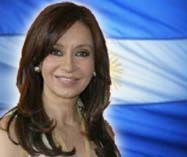Argentine president faces severe electoral blow
 Buenos Aires - Argentine President Cristina Fernandez de Kirchner stands before a likely defeat in Sunday's midterm legislative elections in the South American country, as she faces a strong challenge from within the ranks of her own party.
Buenos Aires - Argentine President Cristina Fernandez de Kirchner stands before a likely defeat in Sunday's midterm legislative elections in the South American country, as she faces a strong challenge from within the ranks of her own party.
Fernandez de Kirchner was elected president in late 2007, with 45 per cent of the vote - almost double the percentage of her closest rival - and therefore without need for a runoff vote. She earned the chance to build on the political project launched by her husband and predecessor Nestor Kirchner (2003-2007).
Since then, however, the presidential couple's control of the country appears to have slipped significantly. Last year, the government pushed through a law to increase export tariffs on soy and other farm produce, making the tax rate rise with the price of the commodities in the world markets.
The move triggered a lengthy farmers' strike that caused price hikes and food shortages in urban centres including Buenos Aires.
However, the political consequences of the government's evident miscalculation were much more serious.
First, the strike became a unifying factor for the weak, dispersed opposition to the Kirchners.
Second, the government gave in to demands that the tariff increase be approved by Congress, only to see its own majority crumble as farming constituencies called their representatives to order. Eventually, the government proposal was dramatically defeated in the Senate, with the decisive vote coming from her own Vice President Julio Cobos.
That was a critical turning point for Fernandez de Kirchner, the sequence that turned a very solid government into a vulnerable leadership that indeed became a liability for many of its erstwhile allies.
With this in mind as Argentinians go to the polls on Sunday, the presidential couple stands to lose about 15 percentage points from their support in the presidential election of 2007, and also their majority in Congress.
According to opinion polls, they could get only 30-35 per cent of the national vote in a mid-term elections in which half the seats in the lower chamber of the Argentine Congress and a third of those in the Senate are up for grabs.
Many observers see Sunday's vote as setting the stage for the 2011 presidential election.
In the 2007 vote, the Kirchners felt so powerful that they set in motion a rare husband-to-wife transition that was easily ratified at the polls. Now, they are facing internal political movements that are a trademark of Argentina's recent political history.
The Kirchners are centre-left populists who fit in the Peronist movement, named for the historic Argentine leader Juan Peron, who was elected president three times until he died in office in 1974. But the Peronist movement is ideologically diverse, and more conservative elements within it are challenging the leadership of the presidential couple.
The government has acknowledged the pressure. In 2007 Nestor Kirchner felt so self-assured that he gave up the chance for a certain second consecutive term in office and instead fielded his wife as his successor. Some observers saw it as a combined effort with unlimited scope into the future.
Barely two years later, Cristina Fernandez de Kirchner is so aware of her political vulnerability that she needed tricks to brace her position, tricks that are striking even by Argentine political standards.
The government is relying on big names, even admitting that many of them do not intend to swear in as legislators at all. Well-known governors are standing for Congress, for example, in the full knowledge that their very names will attract votes, but certain also that they will not leave provincial governments to head for the legislature.
In the province of Buenos Aires, the traditional stronghold of Peronism and also a decisive constituency -since it holds almost 40 per cent of the national electorate, the government is fielding Nestor Kirchner as its top candidate for Congress.
The former president is immersed in a tight race against conservative Peronist Francisco de Narvaez. Kirchner is the candidate of the Frente Justicialista para la Victoria (FJPV, the Peronist Front for Victory), while the wealthy businessman De Narvaez stands for the Union PRO, a coalition of dissident Peronists and the PRO movement of Buenos Aires Mayor Mauricio Macri.
Outside Peronism, only the coalition Acuerdo Civico y Social (ACyS, the civic and social agreement) can count on a substantial inflow of votes at the national level.
Despite the foreseeable defeat of the government, Argentina is a long way from its famous crisis of the beginning of the decade, which saw Fernando de la Rua resign and leave the presidential palace in central Buenos Aires in a helicopter amid widespread streets protests and riots.
However, the loss of the legislative majority is indeed bound to be painful for Cristina Fernandez de Kirchner, since the government has since 2001 had full powers to just run budget changes past Congress.
The opposition, on the other hand, is feeling its ground for 2011, and that ground feels a lot more solid than what it found ahead of the 2007 election. (dpa)